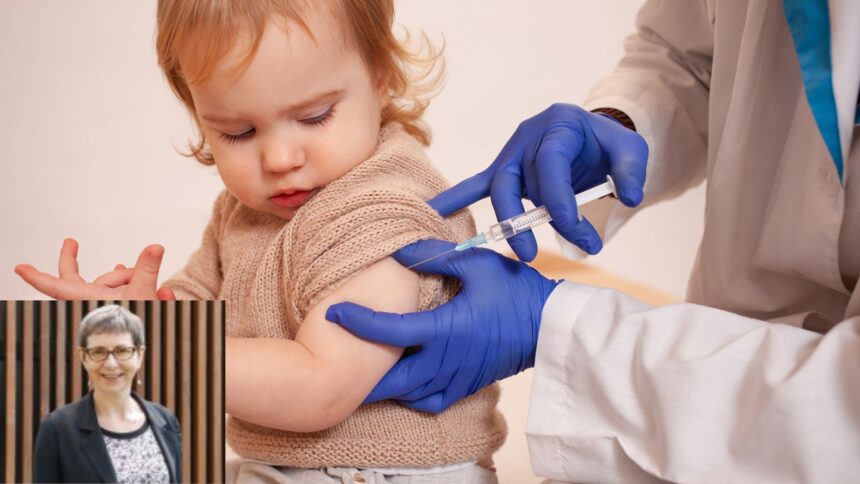NewzVille Exclusive
In 2020, WHO and global stakeholders endorsed the Immunization Agenda 2021–2030. The Agenda aims to achieve the regional targets as a core indicator of impact, positioning measles as a tracer of a health system’s ability to deliver essential childhood vaccines.
Dr Natasha Crowcroft, Senior Technical Adviser Measles and Rubella at World Health Organization(WHO) explains some of the intuitive questions on Measles.
What is Measles?
Measles is a highly contagious, airborne disease caused by a virus. The virus spreads easily when an infected person breathes, coughs or sneezes. It can cause severe disease, complications, and even death.
Measles can affect anyone but is most common in children.
Measles infects the respiratory tract and then spreads throughout the body. Symptoms include a high fever, cough, runny nose and a rash all over the body.
Why is Measles increasing?
Despite the availability of a safe and cost-effective vaccine, an estimated 107 500 people died from measles in 2023 – mostly children under the age of five years.
During Covid-19 pandemic ,the suspension of immunization services and declines in immunization rates and surveillance across the globe left millions of children vulnerable to preventable diseases like measles.
What are the Signs and Symptoms of Measles?
Symptoms of measles usually begin 10–14 days after exposure to the virus. A prominent rash is the most visible symptom.
Early symptoms usually last 4–7 days. They include: running nose, cough, red and watery eyes, small white spots inside the cheeks.
The rash begins about 7–18 days after exposure, usually on the face and upper neck.
It spreads over about 3 days, eventually to the hands and feet. It usually lasts 5–6 days before fading.
Due to Measles Complications arise like, blindness, encephalitis (an infection causing brain swelling and potentially brain damage), severe diarrhoea and related dehydration, ear infections, severe breathing problems including pneumonia.
If a woman catches measles during pregnancy, this can be dangerous for the mother and can result in her baby being born prematurely with a low birth weight.
Most deaths from measles are from complications related to the disease.
Complications are most common in children under 5 years and adults over age 30. They are more likely in children who are malnourished, especially those without enough vitamin A or with a weak immune system from HIV or other diseases. Measles itself also weakens the immune system and can make the body “forget” how to protect itself against infections, leaving children extremely vulnerable.
How Measles is transmitted?
It spreads by contact with infected nasal or throat secretions (coughing or sneezing) or breathing the air that was breathed by someone with measles. The virus remains active and contagious in the air or on infected surfaces for up to two hours. For this reason, it is very infectious, and one person infected by measles can infect nine out of 10 of their unvaccinated close contacts. It can be transmitted by an infected person from four days prior to the onset of the rash to four days after the rash erupts.
Measles outbreaks can result in severe complications and deaths, especially among young, malnourished children. In countries close to measles elimination, cases imported from other countries remain an important source of infection.
How to get the treatment?
There is no specific treatment for measles. Caregiving should focus on relieving symptoms, making the person comfortable and preventing complications.
Drinking enough water and treatments for dehydration can replace fluids lost to diarrhoea or vomiting. Eating a healthy diet is also important.
Doctors may use antibiotics to treat pneumonia and ear and eye infections.
All children or adults with measles should receive two doses of vitamin A supplements, given 24 hours apart. This restores low vitamin A levels that occur even in well-nourished children. It can help prevent eye damage and blindness. Vitamin A supplements may also reduce the number of measles deaths.
How to prevent Measles?
Vaccination is the most effective way to prevent measles. All children should be vaccinated against measles. The vaccine is safe, effective and inexpensive.
Children should receive two doses of the vaccine to ensure they are immune. The first dose is usually given at 9 months of age in countries where measles is common and 12–15 months in other countries. A second dose should be given later in childhood, usually at 15–18 months.
Routine measles vaccination, combined with mass immunization campaigns in countries with high case rates are crucial for reducing global measles deaths. The measles vaccine has been in use for about 60 years. The measles vaccine is also used in emergencies to stop outbreaks from spreading. The risk of measles outbreaks is particularly high amongst refugees, who should be vaccinated as soon as possible.
Combining vaccines slightly increases the cost but allows for shared delivery and administration costs and importantly, adds the benefit of protection against rubella, the most common vaccine preventable infection that can infect babies in the womb.
In 2023, 74% of children received both doses of the measles vaccine, and about 83% of the world’s children received one dose of measles vaccine by their first birthday. Two doses of the vaccine are recommended to ensure immunity and prevent outbreaks, as not all children develop immunity from the first dose.
Approximately 22 million infants missed at least one dose of measles vaccine through routine immunization in 2023.
(Inputs and statistics are from World Health Organization)






